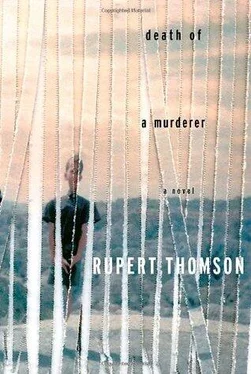What he learned that night would alter him for ever. Certain stories lodge like rusty hooks in the soft flesh of the mind. You cannot free yourself.
Sitting in the mortuary with his eyes shut, Billy heard the rasp of a lighter.
“You’d know all about that, of course,” he said.
His eyes still closed, he saw the woman not in lilac or maroon, not in a suit at all, in fact, but in a kind of gown. Shapeless it was, and hooded. Brown or black.
“They’ll never forgive me, will they,” she said, “not even now I’m dead?”
“No,” he said. “I don’t think they will.” He paused, and then decided that he might as well tell the truth. “It’s strange, but I think people hate you even more now. It’s like what you did has got worse with the passing of time — or maybe it’s taken this long for the full horror of it all to sink in.”
She fell silent, as if the idea hadn’t occurred to her before. At times, he wasn’t sure whether she was still there, but then he would hear a swift, sharp intake of breath as she inhaled, or the faint scrape of a shoe against the floor as she altered the position of her legs. Though he was in danger of falling asleep, he resisted the temptation to open his eyes. He didn’t want to see her again. He had already seen enough of her, he felt, to last a lifetime.
“Sometimes I dream I’m standing in a crowd,” she said at last, “or else I’m walking along, surrounded by hundreds of people. I don’t know any of them. They’re all strangers. But it feels like — like luxury.” There was another silence. He imagined a cigarette butt falling in slow-motion through the air and vanishing between two bars of the drain’s dark metal grille.
“To be part of a crowd,” she said. “You don’t know how I long for that.”
“They’d probably tear you to pieces,” he said.
“In my dream, no one recognises me. They’ve never heard of me. They don’t notice me at all.”
“You did something people couldn’t bring themselves to think about. You forced them to imagine it. You rubbed their noses in it.”
That was what they meant, he realised, when they called her a monster. She had shown them what a human being was capable of. She had given them a glimpse of the horrific and terrifying acts that lay within their grasp. She had reminded them of a truth that they had overlooked, or hidden from, or lied to themselves about.
“That’s why they can’t forgive you,” he said. “I mean, maybe if you’d broken down in court—”
She let out a short, sardonic laugh. “I’m not a bloody actress.”
“They needed something. ”
“They wouldn’t have believed me.”
He thought about that. Over the years, there had been a number of people who had taken her side. They saw her continuing imprisonment as political, driven not by the rule of law but by popular opinion. Other murderers were freed when they had served their sentences — why not her? Clearly, she was no danger to society. In fact, the opposite was true: were she to be released, society would be a danger to her. And here was the savage irony: taxpayers’ money would have to be used to protect the woman from what the taxpayers themselves would try and do to her. No government would willingly put itself in the position of having to defend such a policy. Instead, the responsibility for her fate was handed swiftly from one Home Secretary to another, like a particularly hazardous game of pass-the-parcel.
“You’re probably right,” he said. “I don’t think there was any way back from what you did. They’d never have let you out, not in a million years.”
“It already feels like a million years.” He heard her light another cigarette. “I smoked myself to death,” she said. “What else was I going to do?”
“You did make it worse for yourself, though,” he said. “You made mistakes.”
“Mistakes? What mistakes?”
“Afterwards, I mean. You said things you shouldn’t have. To journalists.”
He thought she might bridle at that, but she kept quiet.
“And that picture they took of you when you got your degree,” he said, “the one that appeared in the papers.”
“What about it?”
“You shouldn’t have smiled.”
“So now I’m not allowed to smile…” She sounded crestfallen, even defeated, but when she spoke again, a few moments later, her voice had all its old bluntness. “And you,” she said, “are you so innocent?”
Billy went over to the stainless-steel sink in the corner and brought handfuls of cold water up to his face. He had been honest with her, brutally so, and she had put up very little resistance, though she had hit back towards the end, when he was least expecting it, but now that she had gone, he was left with an uneasy feeling. He’d talked too much. He hadn’t listened. He hadn’t paid attention and, as a result, he felt there was something he had failed to understand. He turned off the tap, then tore off a couple of paper towels and dried his face and hands. Failure, he thought. Firstly, she had failed to realise what she was getting into. Then she had failed to object, to disassociate herself. Something was lacking in her, and it had made her lethal. But what about me? he thought as he dropped the sodden paper towels in the bin. Am I so innocent?
Almost twenty years had passed, but he could still see Venetia sitting across from him in that prim, drab hotel dining-room in the North Pennines.
“If I tell you—” Venetia said, then stopped.
“What?” he said.
“It might change everything…”
“You decide.”
She took a breath and then began. When she was a little girl, she said, she hardly saw her father. He was always off somewhere — at work, or out with clients, or travelling. She would long to spend time with him, fantasising endlessly about all the things they might do together. Grimacing, she tipped more wine into her glass. George McGarry was his name, she went on, and he was the chief executive of a shipping company — a man of great energy and charm, by all accounts. In his forties he married a lively but delicate woman from Bombay. They had two daughters. Margaret was four years older than Venetia, taller, and more reserved.
“I always felt she should have said something,” and now Venetia looked away, into the room. “But I suppose it was asking too much. Besides, I probably wouldn’t have believed her. I wouldn’t have wanted to believe her.”
Billy felt as if the contents of his stomach were beginning to go sour, and he reached for some water.
“I didn’t really see my father until I was eight or nine,” Venetia went on, “and then suddenly, from one day to the next, he seemed to realise that I existed. I couldn’t have been more thrilled. This was my dream, and I’d almost given up on it. He started calling me V. V, darling. V, my sweet. He would pick me up after school and we would go to the cinema, or if it was summer we would drive out into the country. He had a beautiful car. A Daimler, I think it was — all soft leather and polished wood. It was like his work, the secret, glamorous side of him — the part of him I’d never been allowed to see.”
She looked across the table at Billy, and the expression on her face was one he didn’t recognise. She seemed to be pleading with him, but he wasn’t sure what she wanted. To change the past, perhaps. Impossible, then. The look had a nearness about it too, a confidentiality, and for the first time, possibly the only time, he felt properly included in her life, and it hurt him in a way that was almost physical, both because of the unexpected beauty of the moment, and because he was certain that it wouldn’t last.
Читать дальше












